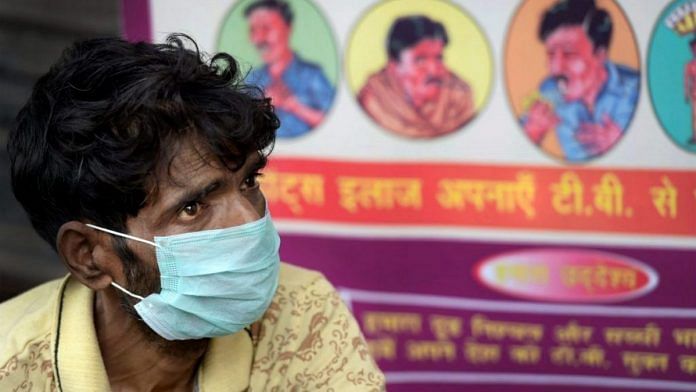
New Delhi: The Government of India has reported a 60 per cent decline in tuberculosis notifications because of the lockdown imposed to control Covid-19, and has put together a rapid response plan to recover lost ground.
The national TB programme, in its communication to states, has expressed apprehension that unaddressed cases and higher household transmission could cause a spurt in the disease, with an estimated 5 lakh additional cases and 1 lakh more deaths in the next five years.
Like Covid, TB too is transmitted by droplets. A bacterial infection, it primarily affects the lungs, though it can also affect other organs of the body and also bones, lymph nodes etc.
In a letter to state governments, dated 4 September, Dr K.S. Sachdeva, project director of the Revised National TB Control Programme (RNTCP), has written: “One pulmonary TB patient, if untreated, can infect 10-15 individuals in a year. In such circumstances, when TB patients are not able to access health services and are confined within their homes, there is all likelihood of an active intense transmission in the household contacts.”
He added: “Recent modelling studies to understand the potential effect of the COVID-19 response on TB epidemiology published by Stop TB Partnership indicate that over and above the existing cases, there would be an additional 514,370 TB cases and 151,120 TB deaths over the next 5 years.”
Also read: TB patients badly hit by lockdown — 80% drop in diagnosis, huge struggle for medicines
‘On the right track until 24 March’
According to the National Strategic Plan for Tuberculosis Elimination, a government programme that aims to eliminate the disease in India by 2025, it kills an estimated 4.8 lakh Indians every year, or more than 1,400 every day — a number that Covid-19 is now threatening to reach. On Monday, over 1,100 people died of the novel coronavirus disease.
“While India was on the right track till 24 March, the national and state-specific lockdown due to Covid-19 has affected all the key strategic interventions resulting in almost 60 per cent decline in TB notification during the lockdown period and moving back to the period where gap between estimated TB case and notified TB cases is increasing,” Dr Sachdeva’s letter noted.
“During the period January-June 2020 almost 5.7 lakh cases (62 per cent drop of notifications) could not be notified against the estimated target due to Covid-19 and lockdown situations, and only 42 per cent TB patient received one or more NPY DBT payments during the same period,” he said, referring to the Nikshay Poshan Yojana Direct Benefit Transfer scheme, under which patients get Rs 500 per month nutrition support for the duration of the treatment.
Rapid response plan
Outlining the rapid response plan to cover lost ground, Sachdeva has also laid down detailed SOPs for the functioning of tuberculosis facilities.
Among the elements of the plan are home sample collection services for contact-tracing of household and workplace contacts of patients, and replacing smear microscopy with molecular testing.
All pending nutritional support payments — TB patients get Rs 500 per month during the duration of the treatment — should be cleared within a month, the letter says.
The most important element is the bi-directional screening plan for TB and Covid that envisages screening patients for both diseases that often have similar symptoms.
Also read: India missed detection of 3 lakh TB cases in 2019, but this is why it’s good news
Active case finding
Sachdeva’s letter asks state governments to start active case finding initiatives for TB, especially in areas where there has been an unexplained drop in cases during the pandemic.
It also calls for a special strategy for urban slums and mapping of migrants for active case tracking and support. Patients who have ID cards that identify them as suffering from the bacterial infection should be allowed unfettered mobility in order for them to access healthcare services.
Among the problems that have plagued the TB programme is the large-scale movement of migrants — taking patients away from the clinics where they were being treated — and deployment of TB control staff for Covid, taking boots off the ground. The entire focus of the TB programme in the last few years has been that if patients cannot reach the system, the system should reach them.
“Each district needs to identify a person who can handle TB patient/public related calls and assist them for required service uptake (sample collection, drug delivery, linkage with treatment supporter or nearby HWC (health and wellness centres) or PHI (public health institutes) providing treatment,” Sachdeva’s letter adds.
“All confirmed TB patients need to be provided with TB ID cards, which should allow unrestricted mobility and assist TB patients for availing the TB diagnosis, treatment and follow up or DBT scheme.”
Also read: As TB diagnosis sees a fall, states are now testing Covid-negative patients for the disease

COMMENTS